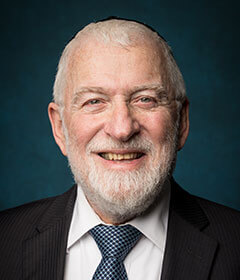Rabbis revolt over LGBTQ+ club, exposing fight over queer acceptance at Yeshiva University
A settlement appeared to create a place for queer students to be themselves at YU. Its rabbis aren’t having it.

Signage on the campus of Yeshiva University in Washington Heights. Photo by Spencer Platt/Getty Images
Yeshiva University’s approval of a campus LGBTQ+ club in a landmark settlement seemed to herald a new era of acceptance for queer students at the flagship Orthodox Jewish university. But amid uproar in the wider Orthodox community, the school’s rabbinic leaders have tried to make clear in the days since that nothing could be further from the truth.
In a series of public statements since the March 21 settlement, senior rabbis at Rabbi Isaac Elchanan Theological Seminary, YU’s rabbinical school, have repeatedly asserted that the only LGBTQ+ club they would tolerate at the school — and the one they say was approved — is one that encourages celibacy.
Were the school forced to recognize a club that espoused pride in queer identity, one RIETS rosh yeshiva (head rabbi) indicated he would quit.
“It would be akin to the Yeshiva being asked to teach the New Testament,” said Rabbi Aryeh Lebowitz, RIETS’ director of ordination, in a March 28 episode of Halacha Headlines, a podcast about Orthodox community issues. “You would sooner shut down the Yeshiva than teach the New Testament.”
The rabbis’ comments, which framed queerness as a choice driven by one’s evil inclination, reveals that the settlement did little to bridge the chasm between queer Jews and the most respected authorities in Modern Orthodox Judaism. And they reflected broader uncertainty about how much power the university will have to regulate the new club.
The settlement, which came after nearly four years of litigation, established a new club called Hareni, a Hebrew word that replaced the club’s previous name, the YU Pride Alliance. Announcing the deal in an interview with The New York Times, the group’s co-president, Hayley Goldberg, said the agreement showed “that you are allowed to be a queer Jew on campus at Yeshiva University.”
Goldberg’s quote — and, perhaps, its splashy appearance in a publication some in the Orthodox world hold in contempt — sent the school’s president, Rabbi Ari Berman, into damage control. Both he and the school issued follow-up statements saying that Hareni was actually the same thing as an LGBTQ+ support group the school had offered in 2022 called Kol Yisrael Areivim. At the time, no one joined.
Both Lebowitz and Rabbi Hershel Schachter joined Halacha Headlines to clarify what they saw as a mischaracterization of the settlement.
Schachter called Goldberg and her co-presidents “wiseguys” who had lied to the Times about the deal’s terms. And he made a passing comment, seemingly about the Pride movement, that conveyed particular alarm around transgenderism.
“The gays have an international organization to convince the whole world that the men should convert to women, the women should become men, that everything’s wrong,” Schachter, 83, said.
Religious refusal
The comments by Schachter, who is arguably the foremost living authority on Jewish law in Modern Orthodoxy, were consistent with earlier remarks on LGBTQ+ identity that depict it as a failure of free will. In 2010 he co-authored a statement on “Torah View on Homosexuality” that said homosexuality was among the most “egregious and vile” forms of behavior and recommended therapy for Jews attracted to the same sex. And he wrote in a statement last week that he rejected LGBTQ+ “ideology, lifestyle and behavior.”
Lebowitz, who became the head of the ordination program last year, described LGBTQ+ people as having “a yetzer hara to do very serious aveiros (sins) of arayos (sexual immorality).”

Still, both Schachter and Lebowitz expressed concern for LGBTQ+ students on the podcast. They acknowledged the alarming pattern of suicides by gay Orthodox Jews in recent years, including that of a YU alumnus named Herschel Siegel.
“This is an impossible problem,” Lebowitz, 47, said. “Nobody has figured out a way to handle it. And everyone’s grappling with it.”
The only solution that comported with Jewish law, as they saw it, was a path of celibacy.
In Schachter’s view, the university was helping the plaintiffs by offering a support group that helped them achieve that goal. He said in last week’s statement that giving his blessing to Kol Yisrael Areivim in 2022 had been a mistake, however, because any notion of a LGBTQ+ club at YU — even one promoting celibacy — “continues to create confusion.”
Asked by the podcast’s host whether the school might simply concede the necessity of living among sinners, Schachter said, “Maybe you’re right. But a lot of the rebbes would rather teach in a different school. Even some of the rebbes now want to leave. So they’re looking around for a different job for next year.”
A charged term
Some of the disagreement between the parties seemed to be over the conception of Hareni as a “Pride” club. To some of the rabbis, the word implies the embrace of sin, doing harm that far exceeded the benefits of having a support group for LGBTQ+ students.
Berman, in his first extended statement following the settlement, said that “what a Pride club represents is antithetical to the undergraduate program.”
Lebowitz, the ordination program director, said the notion “that there’s some sort of Pride club in Yeshiva, that the rebbeim are somehow going to continue to teach in a Yeshiva that allows for violations of issurim (prohibitions) in the Torah, that even encourages it — we would all walk out the door the moment that that happens.”
Rachael Fried, the executive director of JQY, an organization that supports LGBTQ+ Orthodox Jews, called the rabbis’ comments “unfortunate and disappointing.”
“There seems to be a very big disconnect between what Orthodox leadership thinks Pride is, and what Pride actually is for the people for whom it pertains,” Fried said. “Pride at its core is about self-worth and collective dignity and being able to exist without shame.”

The plaintiffs have not backtracked from earlier assertions of the settlement’s terms, which they said included the stipulation that the group could use the term “LGBTQ+” in public material and did not contain any prohibition on using the word “pride.”
While the settlement’s full terms remain sealed, a statement from Hareni suggested that the club would eventually share the details.
“We look forward to sharing club protocols soon and working with the entire community to make the club a success,” the club said.
A YU spokesperson said the settlement “stipulates rabbinic oversight as is true of all of our clubs.”
Both parties declined to comment on the rabbis’ public statements. Lebowitz and Schachter did not return interview inquiries.
A balancing act
As one of the pillars of the Orthodox world, what YU says and does reverberates far beyond its campus in Manhattan’s Washington Heights, and university affairs are often seen as a referendum on the movement. Shortly after the settlement was announced, a petition calling on YU to drop “yeshiva” from its name began circulating in the Haredi press, saying the school had “essentially caved to the LGBT movement.”
And YU’s willingness to fight the Pride Alliance all the way to the Supreme Court was not without dissent at the university, whose enrollment is roughly 6,000 between the undergraduate program, seven graduate schools and the seminary. Some 1,600 students, alumni and faculty signed letters in 2022 calling on the university to recognize the club after the lawsuit became public.
But unlike tenured professors at a typical university, rabbis like Schachter, who is perhaps the most revered figure at the yeshiva, retain the stature and authority to enact or prevent change.
Meanwhile, many Orthodox communities have found ways to include or accept LGBTQ+ Jews. Hundreds of Orthodox rabbis allow gay Jews to become members and participate in prayer services, according to Eshel, a group that advocates for queer Orthodox Jews. Other Orthodox institutions remain more cautious — if not antagonistic — toward queer identity.
In spite of the rabbis’ public disavowal of the club, Fried, the JQY director, remained upbeat about the settlement, which she said established new precedent for compromise between Orthodox institutions and their queer membership.
“At the end of the day, it seems like the students and the administration worked in collaboration to find common ground,” she said. “The students feel good about it, and it seems like the administration, you know, they agreed on it. And I think that’s a huge deal.”
Editor’s note: The story has been updated to clarify information provided by Hareni.
















